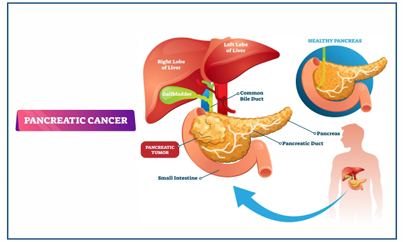Pancreatic cancer comes in a variety of forms. It might impact:
Adenocarcinomas are the name for tumors that affect
the exocrine glands. The pancreatic ducts are where this type of cancer most frequently
develops.
Endocrine glands: Less frequently occurring and
mostly benign cancers. frequently have an impact on hormone-producing cells. These tumors are
also known as neuroendocrinetumors or islet cell tumors.
Symptoms
Asymptomatic pancreatic cancer in its early stages is possible. As per the Pancreatic cancer specialist doctor in dwarka
delhi, it only comes when the illness worsens &then symptoms emerge, which include:
- Digestive issues, such as irregular feces, nausea, or vomiting
- Back and upper abdominal pain
- Reduced appetite
- Unexpected weight loss
- Jaundice (yellowing of the skin and whites of the eyes)
- Diabetes patients' extremely high sugar levels
Causes
Cancer Robotic surgeon in
Delhi
Typically, the precise cause of pancreatic cancer is unknown. One of the causes of the emergence
of cancer is the uncontrolled multiplication of pancreatic cells due to DNA mutations.
In a few rare instances, it begins in the pancreatic ducts. Some types of the malignancy include
pancreatic adenocarcinoma, pancreatic endocrine cancer, and pancreatic neuroendocrine tumors.
Pancreatic cancer risk factors include:
- Smoking Obesity and/or overweight
- Excessive alcohol use
- Diabetes Using chemicals and insecticides
- Liver damage chronic pancreatic inflammation
Diagnosis
As suggested by GI cancer Robotic surgeon in Delhi, the following are the key test which should be kept in mind:
- Imaging, biopsies, and blood testing are all used in diagnosis.
- A blood test
- Check the levels of carcinogenic indicators to see if cancer is present.
- An MRI
- Pancreatic cancer can be diagnosed using precise pictures of the pancreas obtained from an abdominal CT scan.
- Ultrasound with endoscopy
- Enables better pancreas imaging examination because imaging is carried out through the abdomen.
- Biopsy
- To look for anomalies, a sample of the pancreas is taken.
- Using magnetic resonance imaging (MRI), the pancreas, liver, and gall bladder can all be seen in great detail in the abdomen.
- The extent of cancer spread can be assessed using positron emission tomography (PET).
Treatments
The course of treatment is determined by the tumor's location, age, and overall health. Radiation, chemotherapy, and surgery are all used in treatment.
Complications
According to Best cancer specialist in Delhi, Following are some effects of pancreatic cancer:
- Bowel obstruction: As the tumor enlarges, the intestine may get compressed, preventing bowel movement.
- Severe nausea and vomiting brought on by medication side effects or a tumor pressing against the stomach, making it challenging to eat properly.
- Because the pancreas may not be producing enough digestive fluids, nutrients from the food won't be metabolized effectively.
Jaundice can result from a tumor blocking the bile duct.
- Pancreatitis: pancreatic inflammation
Prevention
There is typically no known preventative measure.
The following behaviors can enhance general health:
Regular exercise, abstaining from nicotine, and maintaining a healthy diet.
- Imaging, biopsies, and blood testing are all used in diagnosis.
- A blood test
- Check the levels of carcinogenic indicators to see if cancer is present.
- An MRI
- Pancreatic cancer can be diagnosed using precise pictures of the pancreas obtained from an abdominal CT scan.
- Ultrasound with endoscopy
- Enables better pancreas imaging examination because imaging is carried out through the abdomen.
- Biopsy
- To look for anomalies, a sample of the pancreas is taken.
- Using magnetic resonance imaging (MRI), the pancreas, liver, and gall bladder can all be seen in great detail in the abdomen.
- The extent of cancer spread can be assessed using positron emission tomography (PET).

